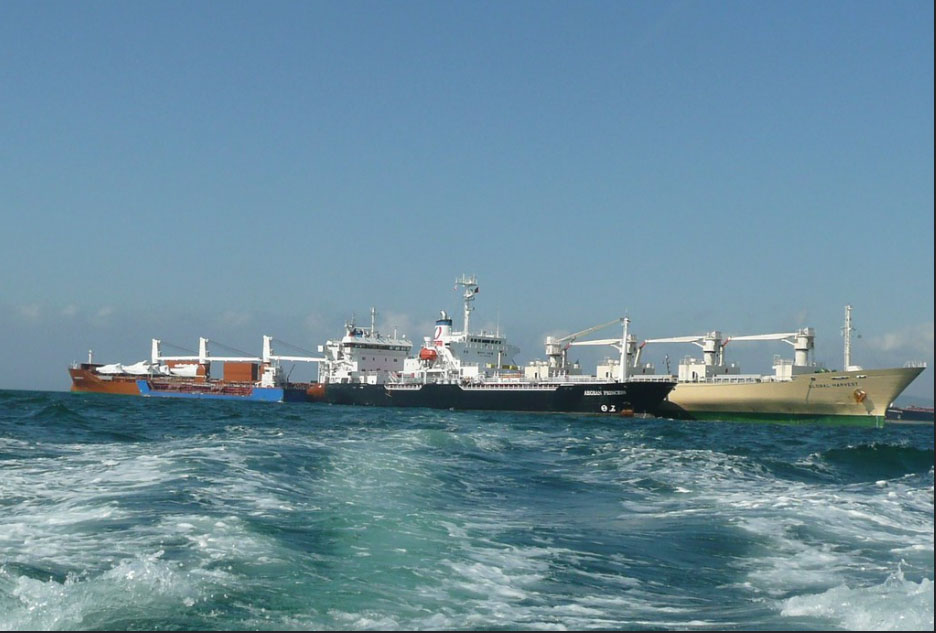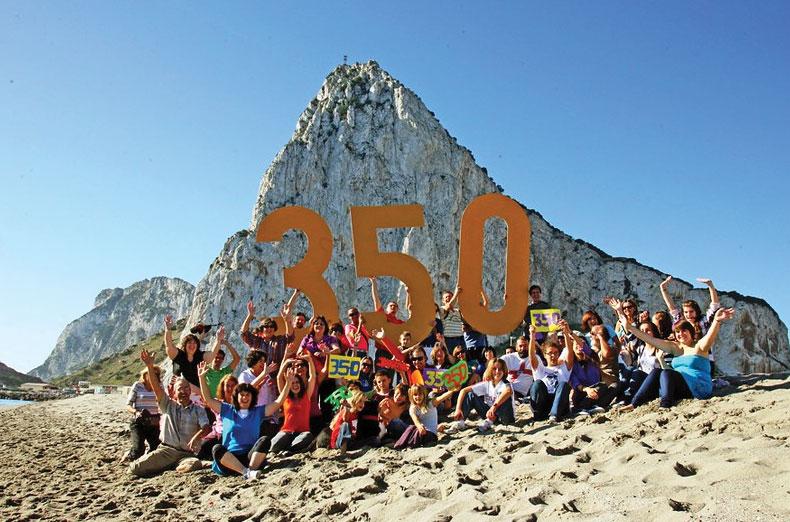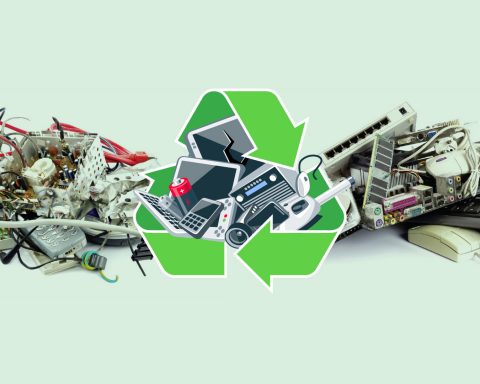The ESG (Environmental Safety Group)
Janet Howitt, co-founder and Chairperson of the Environmental Safety Group (ESG) explains how in In May 2000 a damaged nuclear submarine, HMS Tireless, limped into Gibraltar and caused great concern among the community and that became the catalyst for the formation of the ESG. “At the time I had been back in Gibraltar for 6 months having been based in Tanzania, East Africa, for the preceding 10 years,” she says.
“A few of us started meeting up to discuss this issue and to organise and lend support to the Voice of Gibraltar that had already started campaigning on this,” Janet states. “Our small but active group called ourselves Concerned Parents, then Concerned Citizens and soon after, formalised as the ‘Environmental Safety Group’ of which Tom Scott and I became co-founders and spokespersons.”
Significant protests took place in Gibraltar and in nearby Algeciras where approximately 70,000 people are thought to have attended, including the ESG with a banner showing support for a protest against a regional threat posed by Tireless. “The submarine eventually left having stirred up issues of constitutional importance locally. It also helped forge alliances between NGOs across the border, and gave birth to the ESG Committee, made up of dedicated environmental activists,” she explains.
“The Committee had to prioritise its work from the start as it was clear that Gibraltar faced many environmental problems. Overwhelmingly, however, the large and highly polluting Oil Refinery in the Campo area was considered our biggest threat and so became not the only, but the main target of our energy and time.”
With the strong links forged through the intensive submarine campaigns, the ESG and a number of Spanish Environmental NGOs initiated and ran several campaigns and protests against the heavily polluting Oil Refinery. “In 2002 with the support of Hassan’s International Law Firm, we lodged our first official complaint with the European Commission against the Refinery and general poor standards operated by the industrial base in the Campo area,” Janet states. “Our complaint was also signed by the GONHS, and contained evidence and reports from Spanish NGOs of examples of various breaches of environmental regulation by industries in the Campo.”
Thus started what became 8 years of solid lobbying and campaigning at EC level, supported by multiple and substantive cross border protests, the collection of scientific data to support concerns of air quality via the Bay Bucket Brigade, and the creation of a high level team of internationally respected experts and advisers to support ESG’s actions in Brussels. This included Professor Joan Benach, a public health specialist whose work exposed cancer clusters within the triangle of higher mortality in 3 provinces including Sevilla, Huelva and Cadiz, the worst cases being found in the bay itself.
“We also discovered and worked closely with Denny Larson from the USA whose work as the Global Community Monitor involved the training up and equipping of affected communities, living near toxic industries, into setting up Bucket Brigades, to test air quality in their neighbourhoods. This led Denny to India, South Africa, Europe, the UK and then to our Bay where he trained and helped us form a cross border Bay Bucket Brigade made up of 3 NGOs from both Spain and Gibraltar,” Janet reports. This joint approach further depoliticised the nature of the campaign and complaints in Brussels. “We continued to lobby the European Commission directly until the emergence of MEP representation for Gibraltar in Brussels began. We worked steadfastly with a number of interested MEPs namely Neil Parish and Sir Graham Watson, among several others, who supported our case of environmental degradation and threat to public health in the Bay from industry, and eventually saw enforcement measures against the polluting giant. Janet adds that they were also ably supported by industry specialist Stephen Salter from Canada, David Dumas QC from Hassan’s, Moses Benrimoj Environmental Chemist, Tom Scott Marine Engineer, Henry Pinna, James Machin Climate adviser and Sandra Kloff Marine Biologist. Juan Jose Uceda, a well known Bay activist also worked closely with us during these years.”
Turning their sights closer to home it was clear that issues of power generation, traffic, pollution, lack of renewable energy programmes, waste management, planning and development were highly significant. During this time bunkering (refuelling of vessels) had also grown exponentially, without parallel oversight, creating growing levels of air and noise pollution in our coastal areas, neighbourhoods and schools. Janet goes on to say that additionally, Gibraltar saw two maritime accidents of consequence also highlighting the need for VTS and cross-port coordination, among their aims and objectives.
“In 2005 we held the first of what have been 16 major Clean Up events locally. Gibraltar had major issues regarding litter and fly tipping, historic dumping grounds, lack of facilities and recycling, and a general disregard about these problems.” Each year the ESG, together with multiple partners across the community, strove to clean up, raise awareness and push for environmental protection and maintenance of Gibraltar’s green and open spaces, cliffs, coastal and underwater sites. “We have seen significant change take place over time showing the value of this sustained community campaign that will no doubt continue for some time to come,” Janet confirms.
“We learnt very quickly of the need to lobby on a non-party political basis and set about producing a Wish List, or List of Objectives, the first of which was published for the 2003 Elections and has been updated regularly ever since. Our 2019 List contains 15 separate areas summarising key issues and recommendations for action.”
Asked what progress had been made on the 15 points on the list handed to political parties in Gibraltar for consideration, Janet replies that the 2019 list is currently being updated. “There have been a number of improvements and goals met in some areas while others are caught up in the uncertainty of Brexit and now Covid setbacks. Two projects of interest here are the Sewage Treatment and Solid Waste Plant.”
Addressing the issue of Brexit and Covid and the implications of those for the environment, Janet says that the ESG understand that Government is facing a most challenging time in keeping our community safe from the Covid Pandemic while keeping every sector stable. “Public health is a major priority for any community and understandably resources are being ploughed in to ensure the best outcome for us all.”
“Meanwhile Gibraltar faces Brexit also and this will have implications for our environment as we will no longer have the umbrella cover provided by the European Commission for the enforcement of environmental legislation. This is a serious issue for us. Especially regarding cross border environmental threats etc., but we will continue to monitor and research these issues and keep these in focus. The next few months and year will be very significant for us and our environment.”
Is the Government being successful in its mission to achieve a low carbon economy and to make Gibraltar as environmentally sustainable as possible?
“As years go by we are all feeling the growing pressure and concern about Climate Change. Awareness of the issues globally is growing, but the speed of necessary action moving less fast. Locally we know that reports produced on Gibraltar’s Climate Strategy and long-term plans were due to be published at the beginning of the year but these have been delayed due to the necessary focus on addressing the immediacy of Covid and secondly the upcoming upheavals we face due to Brexit.”
“Nevertheless Gibraltar has made progress in the last few years in recording and understanding the true weight of our carbon loads and it’s clear where the major changes need to come from if meaningful emissions are to be eliminated. While a small community we nevertheless have a sizeable comparative carbon footprint due to our desalination for potable water, imports of food, sale of fossil fuels and more.”
“The drive we are seeing to harness the widely available renewable and free energy around us is encouraging and we are glad to see projects being rolled out at an increasing pace. A plan to reduce all carbon impacts via the climate strategy and longer term plans we hope will soon be released and form part of our future to ensure we address this ultimately toughest challenge facing humanity today,” Janet states.
The impact of polluting transport and the implementation of a safe and sustainable transport network for Gibraltar is a hot topic at the moment. What are the views of the ESG in this respect?
“The ESG concurs with the view that people should walk and cycle more and park up their motorised vehicles and motorbikes. We have pushed for a holistic transport plan, which was finally achieved with the very comprehensive STTPP, and agree with its aims but would like to see all the recommendations implemented. This would involve a lot of change – a great public transport service using clean fuels; controls in number of car and bike ownership; phasing out of fossil fuelled vehicles among others. Gibraltar is like the rest of the world that is being overtaken by motorised and polluting vehicles and it is in all our interests to manage this directly together, for all our sakes.”
What can the public do by making changes in their everyday lives to reduce the impact of environmental issues?
Janet explains that every citizen has a role to play to help protect our environment. “From reducing your waste to recycling, to the way you travel, from informing yourself about environmental issues and how you can help, to not littering and encouraging others to do the same. By using water and energy sensibly, to thinking about your diet and how you can change this by eating more plant based food, to support a more equitable and sustainable planet.”
For those interested in more details please refer to www.esg-gib.net.










